August 2022 was barely underway when my mother and I set out for London. She had been looking forward to spending some time at my brother’s place ever since the start of spring and finally felt fit enough to make the trip, as long as air travel could be avoided. While both of us do make a conscious effort to reduce our respective carbon footprints where possible, our reluctance to cross the North Sea by plane stemmed from an entirely different set of concerns.
For months, Schiphol Airport had been in a state of recurring pandemonium due to severe staff shortages across all possible departments. Rather than run the considerably heightened risk of flight cancellations, endless security queues, and lost check-in luggage, we opted to jump on the Eurostar instead.
Ever generous, my brother had booked us a pair of extra spacious Premium seats, which came with a complimentary meal and what turned out to be a free flow of beer and wine. Less than four hours ˗ and more than four Freedom Lagers ˗ after leaving Rotterdam, our train rolled into St. Pancras International station at 8 p.m. local time. My nephew was waiting for us in the main hall and subsequently guided us to the spot where his father and sister had parked the family car. I would not be getting in.
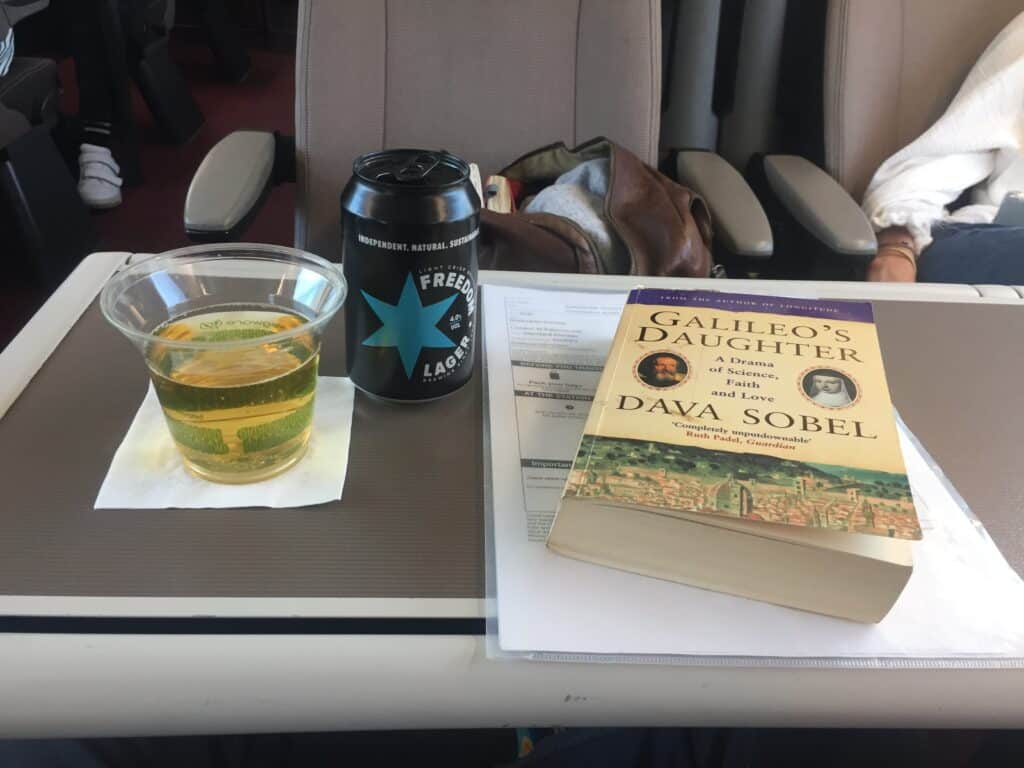
Instead, I made my way across the road to King’s Cross station. Pleased to find that the credit on my old Oyster Card was still valid, I entered the stuffy domain of the London Underground and took the next northbound connection on the Victoria line. A mere two stops and less than ten minutes later, I had reached Finsbury Park. From there, I caught a bus to my final destination.
An Oasis Amid the Grime
In a valley just north of Finsbury Park, roughly 8 km from central London, lies an untroubled urban village characterised by a rich profusion of artisan shops and cafes, local boozers, intriguing Victorian architecture, and lush green spaces. Perhaps most renowned for its long-standing bohemian appeal, Crouch End possesses an unassuming charm that other, more popular London “villages” like Hampstead or nearby Highgate tend to lack. Its residents ˗ a mix of young professionals and artistic types ˗ play an integral role in safeguarding that charm.
Ironically enough, the area’s biggest downside is arguably its greatest advantage ˗ the absence of tube and train stations. For the average, time pressured resident/visitor of the Big Smoke, a compulsory bus ride or twenty minute walk can be something of an inconvenience. This has saved Crouch End from becoming just another stop along the standard tourist trail. Although it ticks all the right boxes, the serene little oasis amid a relentless cityscape has avoided becoming a box to tick.
Crouch End: A Brief History
The name Crouch End is of Middle English origin ˗ ‘crouch’ meaning cross, ‘end’ referring to an outlying area ˗ and is believed to have denoted the border of a parish. A wooden cross was erected at the junction of four well-trodden roads and a small settlement developed around it.
By the end of the 18th century, grander houses had started appearing in the vicinity of the ever-growing congregation of labourers’ cottages. Wealthy merchants seeking refuge from the hustle, bustle, and grime of the city were being drawn to the oasis as well.
Crouch End would remain rural in character until the 1880’s, when the rapid expansion of the regional railway network had made the settlement attractive to commuters. Crouch End station on Crouch End Hill opened in 1867; two decades later, there were a total of seven train stations servicing the wider area encompassed by the modern-day London Borough of Haringey.
Meanwhile, streets lined with more modest Victorian homes materialised at a rapid pace to connect the scattered villas. At the close of the century, Crouch End had flourished into a prosperous middle-class suburb. It is during this period ˗ in 1895, to be exact ˗ that the area’s iconic clock tower arose on Crouch End Broadway, roughly where the wooden cross is said to have once stood.
The hardships of the post-war era led many of Crouch End’s residents to seek greener pastures ˗ or other oases, if you will ˗ elsewhere and the area went into a slump that lasted decades. The closure of Crouch End station in 1954 proved a particularly powerful catalyst for decline; speculative landlords swooped in and many of the older, deserted Victorian houses were carved up into student flats. For a generation or two, the little oasis doubled as bedsit land.
Crouch End in Popular Culture
It is during this period that Stephen King wrote a short story set in and named after the area. Published in 1980, Crouch End is portrayed as a place of outward gentility that hides a gateway to a nightmarish parallel dimension behind its “elderly brick houses like sleepy dowagers.”
A spike in property prices throughout the metropolis attracted progressively wealthier residents from the 1980’s onwards. One of the most notable individuals among them was Dave Stewart of Eurythmics fame, who purchased The Church Studios on Crouch Hill – not to be confused with the previously mentioned Crouch End Hill!. Located in a one-time church, the recording studio birthed the Eurythmics’ sophomore album Sweet Dreams (Are Made of This) in 1983 and has since been graced by the likes of Adele, Jimmy Cliff, and Radiohead, just to name a few.
Urban legend has it that, at some point during the early 90’s, Bob Dylan accepted an invitation from Dave Stewart to drop into the studio at his own convenience. His taxi driver accidentally dropped him off on Crouch End Hill, only slightly west but still wholly separate of Crouch Hill. By coincidence, the plumber that resided at the supposed home of Dave Stewart responded to the same first name. Bob Dylan was told Dave had gone out on an errand but that he was more than welcome to wait inside and have a cup of tea. The plumber returned some twenty minutes later and asked his wife if there were any messages. “No,” she said, “but Bob Dylan’s in the living room having a cuppa.”
Although there are some obvious holes in this story, I do feel it exemplifies the unperturbed nature of the oasis and its inhabitants ˗ pleasantly quirky, but in a refined, deadpan kind of way.
All Aboard!
I have had the pleasure of visiting Crouch End on close to a dozen occasions and usually end up staying for three or four nights when I do. One of my dearest friends ˗ whom I have known since our first month at university ˗ can proudly refer to the oasis as home even though he no longer lives there. We shall call him Louie Jenkini, a corruption of his middle- and surname, because I am in the habit of doing so already.
As soon as I was able to confirm the date of my arrival in London, Louie had gone ahead and made the necessary arrangements for his young family to embark on a trip of their own to his parents’ place in good old Crouch End. Moreover, his parents were kind enough to stress that I too was welcome to stay at the family home – a lovely Victorian townhouse built in 1895 – for as long as I liked. Since I also intended to spend a weekend in Brighton and a couple of days at my brother’s place, I had duly let the Jenkinis know that I would gladly take them up on their offer for the standard duration of three or four nights.
Our brotherhood has a third member. We shall call him Takeover in honour of his deejaying moniker during our university days. Takeover lives in East London and thus in a position to swing by the Jenkini manor after working hours.
Louie, Takeover and I had not been united in full force since a memorable late summer afternoon almost two years earlier, when a portable keg of Adnams Ghost Ship Citrus Pale Ale was sessioned. It was high time for another reunion and Crouch End was a most suitable venue.
Full Speed Ahead
From the moment I got off the W3, one of several bus connections to and from Finsbury Park that halts within a hundred metres of the Jenkini household, I felt borderline euphoric; the type of feeling one gets when setting foot on home turf after a prolonged absence. Louie was waiting for me at the bus stop, as he has done each and every time I have come to visit.
Like a pair of youthful versions of our past selves, we more or less skipped down Palace Road and around the corner with glee at being in one another’s company again. In comparison with our last get-together, we were not at all pressed for time. Ahead of us lay infinite possibilities and, if none of those came to fruition, the promise of mad sessions.
My first evening in Crouch End passed in animated conversation with the Jenkini’s, Louie’s fiance, and their baby boy. After everybody else had retired for the night, Louie and I revved up the engines of the sesh train over a few drams of Penderyn Celt ˗ a bottled taste of Wales which I enjoyed tremendously and recommend highly. In true fashion, this little warm up session took place in the “penthouse”, a cavernous bedroom on the top floor.
Nowadays inhabited by the youngest of the Jenkini brothers, who was enjoying a well-deserved vacation himself and had graciously made the room available to me in his absence, the penthouse still contains some of the more tasteful remnants of the eldest brother’s extended reign. Among them are multiple standing CD racks filled, to a large extent, with 90’s hip-hop albums.
Well Underway
The night of my arrival, Louie slapped on the legendary Enter the Wu-Tang (36 Chambers). Our heads bopped to the barely audible beats and verses that we used to know by heart, and it was agreed that we had been presented an ideal opportunity to freshen up on our Wu-Tang. Feeling the effects of our respective journeys gradually enhanced by the Penderyn, we called it a night before the clock struck one. It was imperative our energy be conserved for all the sessions to come.
I woke up late the next morning and lingered in bed with the book I had started reading on the Eurostar. Louie came up to the penthouse around midday and suggested we listen to a few tracks off Wu-Tang Forever before brunch. Much of the early afternoon was spent alternating between kitchen and shaded sections of garden at the back of the manor in eager anticipation of Takeover, who had been invited over for supper and was expected sometime before five.
For once, we had a perfectly viable excuse to be slothful. Practically the entire continent was being pounded by heat waves and the United Kingdom would not be spared. Even for a child of the tropics, like yours truly, direct exposure to the raging sun became unbearable within the space of ten minutes. Nevertheless, as soon as Takeover showed up, we braced the sizzling tarmac and headed for the “orange store” ˗ a nearby convenience mart which has changed owners several times since it last had any orange features ˗ to get some beer.
Guinness West Indies Porter
Whilst the matriarch of the Jenkini clan was busy working her magic in the kitchen, Louie, Takeover and I kept her company but made sure not to get in her way. Seated at the kitchen table, we shared a couple of bottles of Guinness West Indies Porter, a smooth and full-bodied brew which has become a personal favourite of mine over the past few months. Neither Louie nor Takeover had sampled it before; judging by their reactions, they will jump at the chance to do so again.
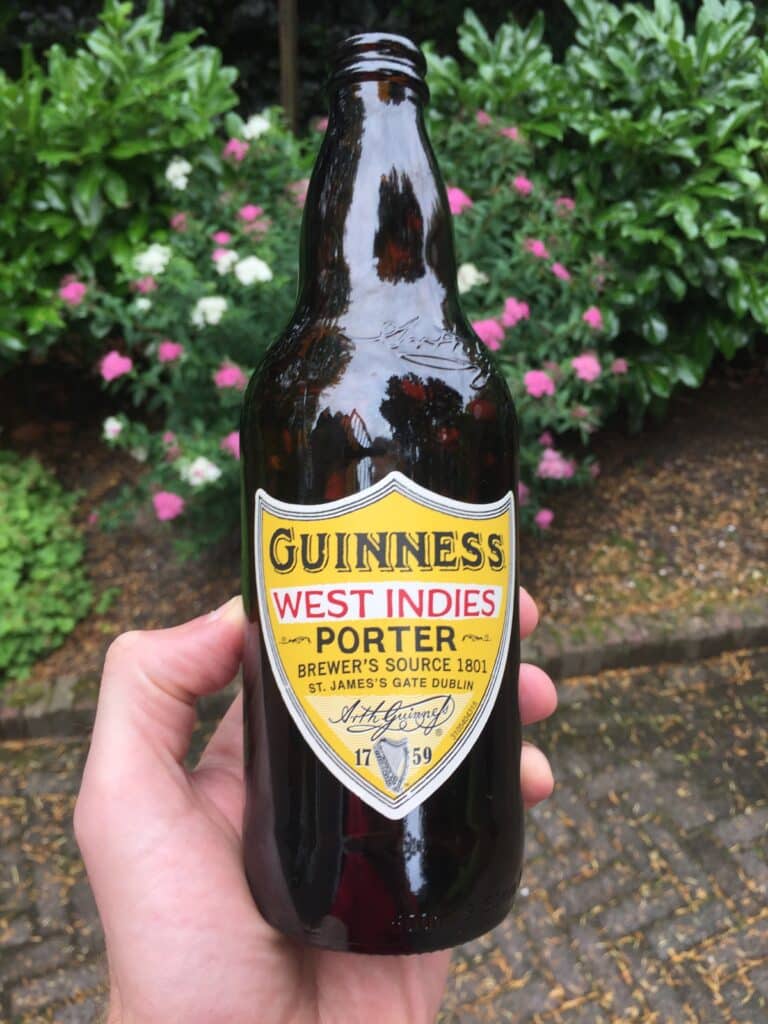
According to the company website, the Guinness Brewer’s Diary contains an entry dating back to 1801 that talks of aspirations to create a recipe for a beer that would keep during long haul voyages without spoiling. This would ultimately lead to the concoction of a brew containing extra hops that was purposely prepared to sustain its freshness, no matter where it was shipped. As a result, “more beer was brewed, more jobs created, and more taste buds tantalised!”
The West Indies Porter is inspired by that brew of yesteryear. Its appearance is ruby red with a frothy head, notes of chocolate and toffee are prominent in nose and taste alike, and a velvety mouth feel precedes a smooth and mellow finish. At 6%, its ABV is on the higher end but the West Indies Porter is by no means overly strong. A delightful aperitif, in my opinion, and my brethren concurred.
The Master Brewer
I did not come across any reading material that suggests Arthur Guinness ˗ first in the famed line of Guinness Master Brewers ˗ ever set foot in Crouch End. I do, however, like to think he would have been a well-respected member of the community had he lived to see modernity in its current form. His resume reads: innovator, entrepreneur, pragmatist, philanthropist, family man who fathered a staggering twenty-one children and, last but not least, fighter. In other words: A complex, versatile character who inspired the formulation of countless anecdotes regarding his persona.
For instance, the man signed a nine thousand (!) year lease on the St. James’s Gate Brewery in Dublin on New Year’s Eve of 1759. The fact that he convinced the brewery’s original owners to settle on a trivial annual fee of just £45, on top of a £100 inheritance used as down payment, is an astonishing feat in itself.
The terms of this original lease ˗ which ceased to apply when the property was bought out and expanded ˗ granted the brewery access to a limited supply of water from the city’s reserves. When the relevant authorities attempted to cut off this supply due to overuse, it is written that “Mr. Guinness violently rushed upon them, wrenching a pickaxe from one and declaring, with very much improper language, that they should not proceed.” If sufficiently provoked, I can certainly picture Louie reacting in similar fashion ˗ especially on an empty stomach.
Dragon Stout
Thankfully, all those present at the Jenkini manor that evening, my second in Crouch End, would be treated to a magnificent English (Sunday) roast. It may not be my main reason for returning to the oasis every chance I get but there is no denying I am in constant craving for the Jenkini roast.
Consisting of roasted chicken, roasted potatoes, Yorkshire pudding, broccoli, carrots, parsnips, and plenty of gravy, it ranks in the top bracket of my favourite meals. In contrast, the beer Takeover had selected to wash down all that goodness was novel to me.
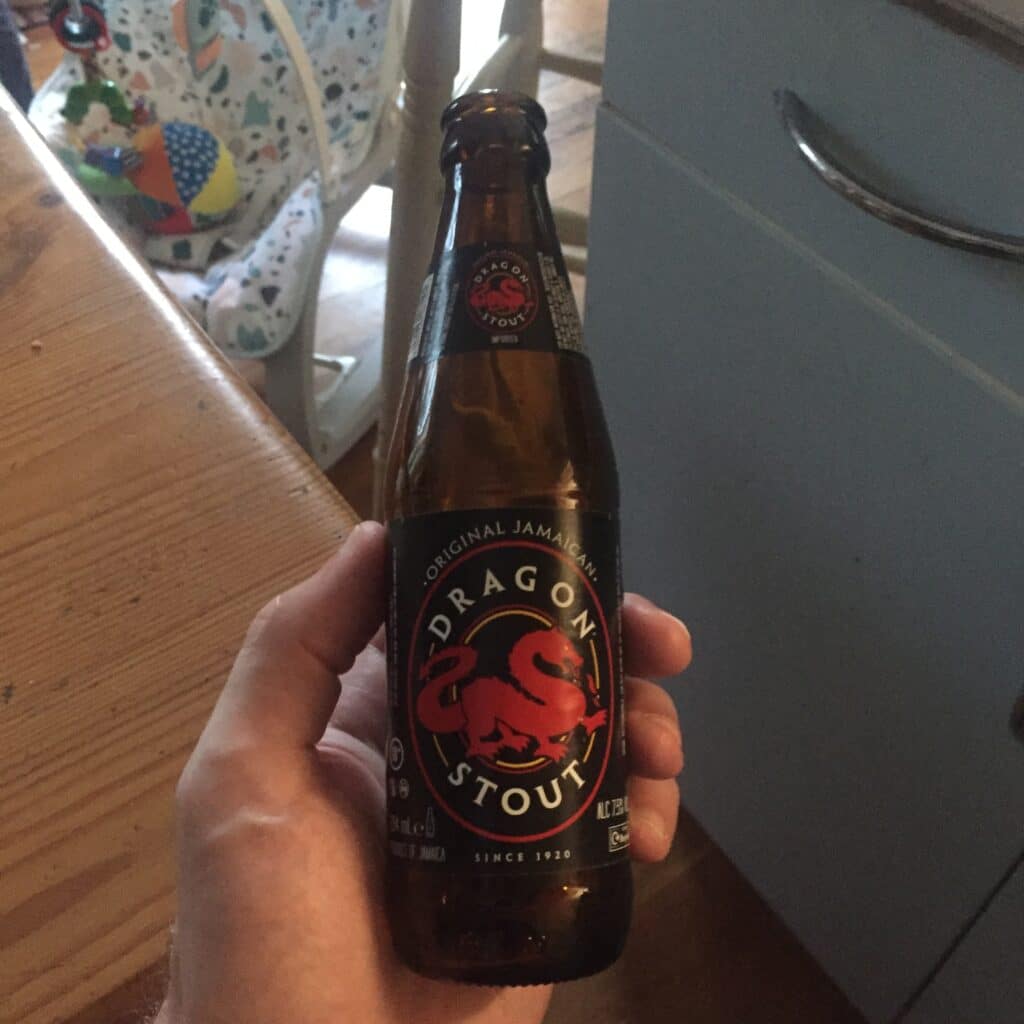
Produced by Desnoes & Geddes Ltd., creator of the globally acclaimed Red Stripe lager, Dragon Stout is an interesting number that has been brewed exclusively in Jamaica since 1961. It pours a rich, opaque dark brown topped with a thin tan head that swiftly gives way to splotchy lacing. Its malty aroma is defined by hints of brown sugar and molasses, which are simultaneously the dominant characteristics of the beer’s creamy palate. The overriding sweetness is complemented by subtle traces of coffee and, the longer the beer sits, a nip of rum in the aftertaste.
Despite packing an ABV of 7.5%, Dragon Stout is surprisingly easy to drink ˗ so be warned! Louie, Takeover and I were in no rush to get buzzed though, limiting our consumption to a single bottle per person in order to prevent the heavenly flavours of the roast from being drowned out before they could be properly savoured.
Hammerton Crunch Peanut Butter Milk Stout
Among the impressive collection of beers on offer at the orange store, a range so diverse it rivals those of your average Dutch supermarket or Berlin Späti, the Hammerton Crunch Peanut Butter Milk Stout immediately caught my attention.
I knew very well Mother Jenkini would be serving her exquisite apple crumble for dessert and was convinced that this stout would complement the final course of our meal rather nicely. A brief glance at the back of the can provided further incentive. Hammerton Brewery is based in Islington, just south of Finsbury Park, making their peanut butter milk stout an authentic local North London brew.
And so, as the saying goes, I was compelled to do as the Romans do. Louie and Takeover, on the other hand, were not exactly tempted; they had a craving for ale.
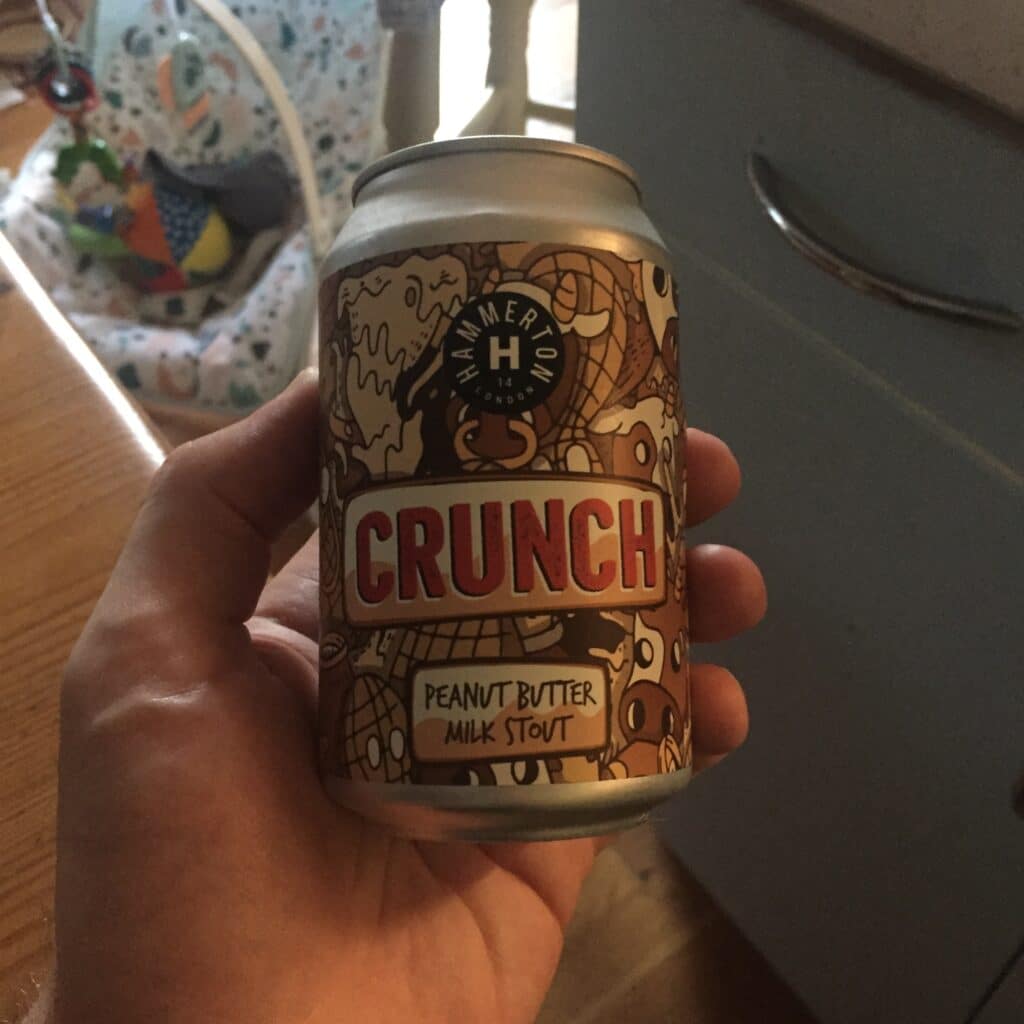
Several hours later, before diving into the crumble, I poured myself a glass of Hammerton Crunch. This thrilling stout with an ABV of 5.4% has a black hue with a thick, creamy beige head and scant lacing. Its nose is predominantly nutty with roasted malts in the mix and showcases the brew’s delicious, rich peanut butter flavour very well. Notes of coffee and toffee also permeate its buttery texture upon ingestion, followed by a roasted finish and mildly bitter aftertaste.
The name of the beer supposedly refers to a sweet crunch of sorts experienced by the drinker as it goes down but I did not discern that particular peculiarity. Not that it made a difference ˗ in my fully saturated and wholly contented state, it was impossible to imagine I had missed out on anything worthwhile.
A Staycation Away From Home
After a valiant but futile attempt to convince Mother Jenkini to let us do the dishes, Louie, Takeover and I made our way up to the penthouse. With Ghostface Killah’s debut solo effort Ironman playing in the background, we killed the bottle of Penderyn and updated one another on the most recent developments in our tumultuous lives. These topics inevitably provided inspiration for random tangents and, before long, we found ourselves discussing ideas and insights more willingly than issues.
Three or four drams in, the sesh train was hooting with hilarity and the bright side of life was unveiled in ways instinctive to old friends. Sadly, we were once again thwarted by time ˗ the strongest of all warriors, alongside patience. The last eastbound train from Crouch Hill station was due to depart at midnight and Takeover wished to avoid a massive detour home by night bus. On the way to the bus stop from which Takeover caught his connection to the station, we made arrangements for an encore that Friday.
The sesh train would continue chugging for another six nights. Takeover and I went to see a few of the sights in Central London on the Friday and picked up some pizzas for dinner on our way back to the Jenkinis. It goes without saying that, as soon as Baby Jenkini could no longer keep his inquisitive little eyes open, we ascended to the penthouse. The rest of the evening was dedicated to Ol’ Dirty Bastard’s masterpiece Return to the 36 Chambers: The Dirty Version, which Louie and I had started listening to that morning before I had sallied forth to the City.
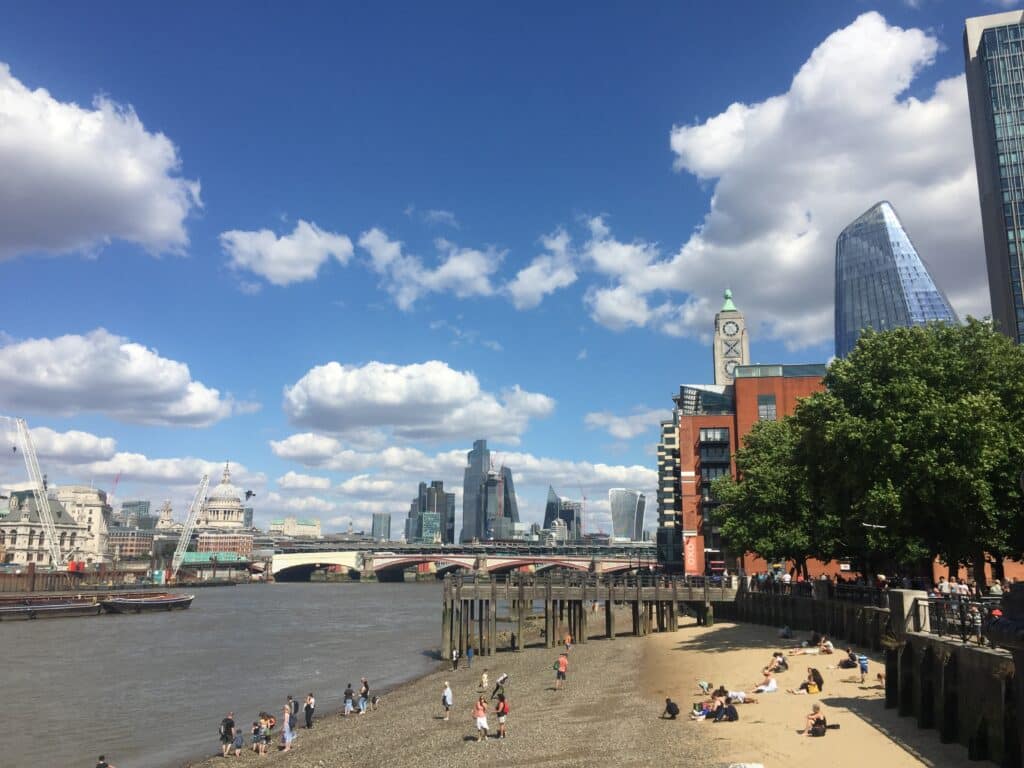
Sporadic Outings
The following day I took an eastbound train from Crouch Hill station to check out Takeover’s ends and meet his significant other for the very first time. Primarily concerned with escaping the compounded heat, we ventured deep into Epping Forest for a few hours and treated ourselves to a marvellous but deadly assortment of Indian curries and condiments for dinner. The night ended in the penthouse, in the company of Louie and Raekwon the Chef by way of his game-changing “mafioso rap” classic Only Built 4 Cuban Linx.
It turns out there was a pride event in Brighton that weekend and I had not succeeded in finding affordable accommodation for a night or two. In the end, I settled on a day trip and spent a scorching Sunday afternoon at the beach with another old friend of mine, one I hadn’t seen since the pre-pandemic era. It was, by any means, a lovely day but I was glad to be heading back to Crouch End when all was said and done.
And there I stayed until the eve of my return to The Netherlands. In my state of perfect contentedness, even the trek out West to the satellite town where my brother lives had taken on the proportions of a virtually insurmountable task.
During my last, blissfully uneventful couple of days in the oasis, I did not rise until Louie came up to the penthouse and put on GZA’s chilling but unmistakeably monumental gem Liquid Swords, my personal favourite of all the solo projects released by Clan members.
Takeover boarded the sesh train one more time before my prolonged ride came to an end, as did the eldest of the Jenkini brothers. Naturally, a few interesting brews were sampled along the way.
A Final Anecdote
For now, I will leave you with one last anecdote from the annals of Crouch End folklore; one that has stuck with me since university. Back in the 80’s or 90’s, a wealthy banker or entrepreneur of sorts who resided in the area gained a reputation for getting gloriously trolleyed every time he stepped into one of the local pubs. What set this chap apart from your average functioning alcoholic was his habit of inviting any other patrons that happened to be present to blow off some steam as well ˗ at his expense!
On many occasions, these sessions continued behind closed doors and deep into the night. It was only a matter of time before the good fellow’s addiction, hand in hand with his intense community spirit, had driven him to destitution. For years he roamed the streets of Crouch End, politely repeating the same line to all those who crossed his path: “10p for a cuppa tea?” Apparently, without fail, the inhabitants of the oasis readily handed over whatever spare change they had on them.
Whether it was mainly a question of guilt or a sense of solidarity that stimulated these innumerable small acts of charity is difficult to say. Regardless, all those in the know have assured me that the big shot turned bum succeeded in kicking his addiction; the donations he received were actually spent on warm meals and cups of tea.
I cannot tell you how and where this local legend met his Maker but, according to Louie, the good fellow’s funeral was held in Crouch End and drew a crowd of several hundred mourners. I like to think that, somewhere far above the clouds, he is watching over the oasis, doing all he can to safeguard its obscurity, ensuring its soul remains intact.

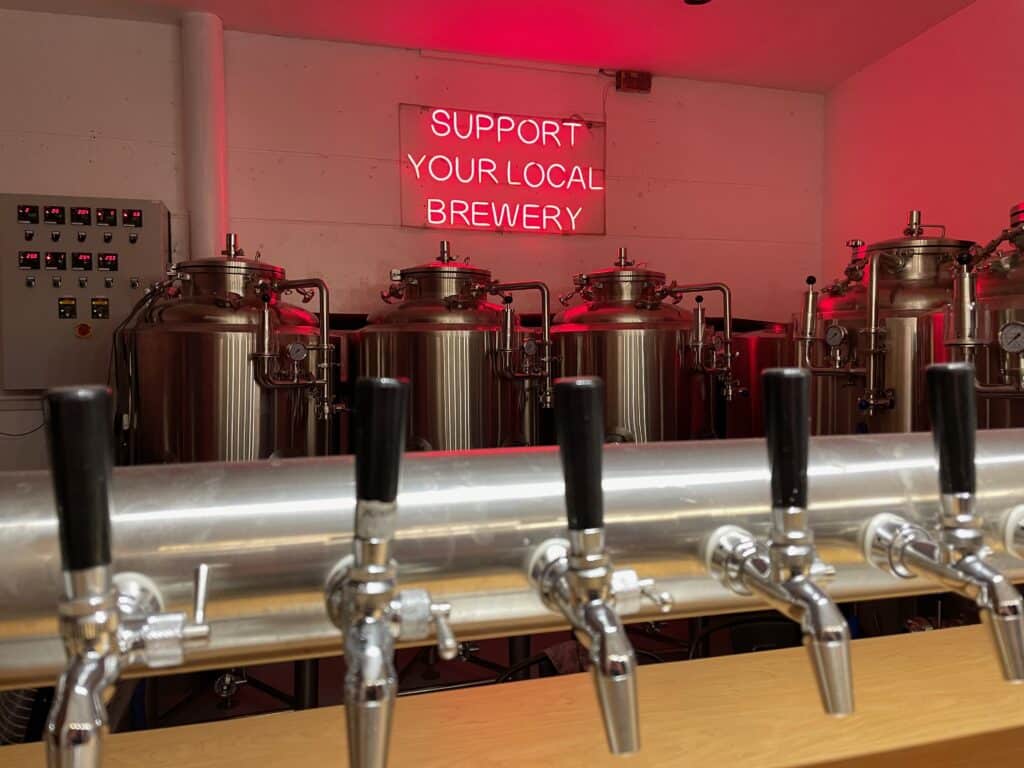
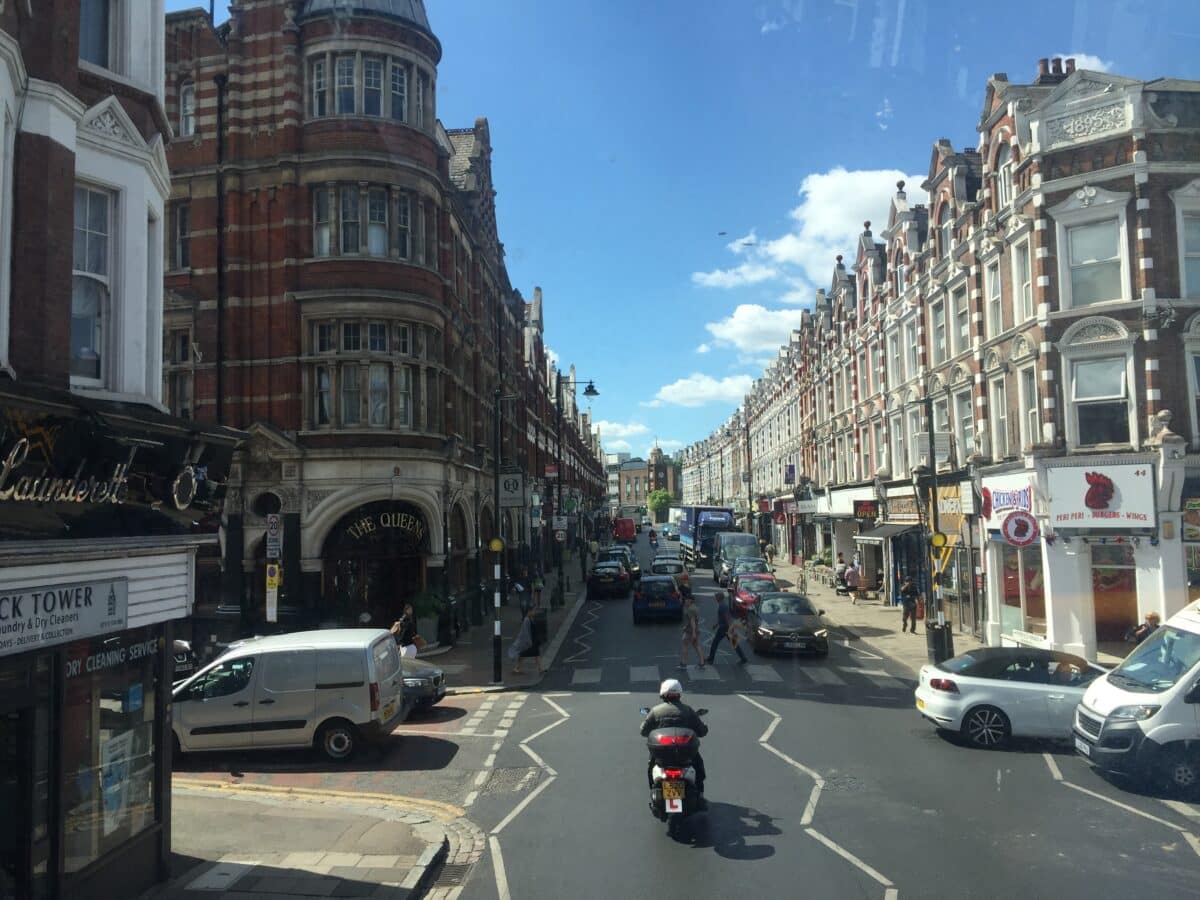
Leave a Reply